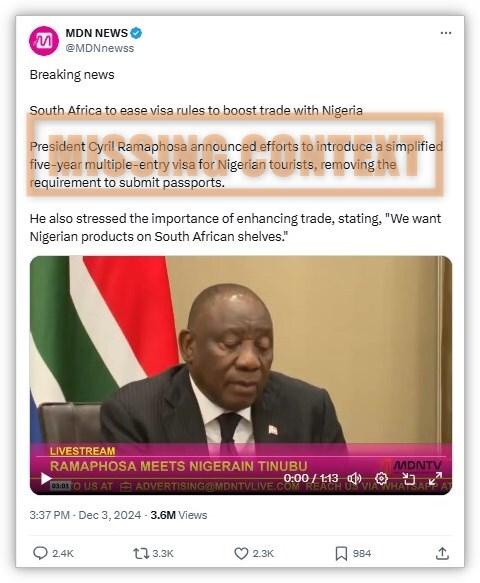The 2-Minute Rule for South African Current Events
The 2-Minute Rule for South African Current Events
Blog Article
An Unbiased View of South African Current Events
Table of ContentsGetting My South African Current Events To WorkSome Ideas on South African Current Events You Should KnowSouth African Current Events - TruthsSome Ideas on South African Current Events You Need To KnowFacts About South African Current Events Revealed
The Limpopo Mirror is released in Louis Trichardt, a community in the north of South Africa's Limpopo province. Picture: Anton van Zyl Today the Competitors Commission is penetrating exactly how on-line information is impacted by AI chatbots, search and advertising and marketing technology. The result of the hearings is very important for the future of information coverage in South Africa.
Registrations and sales of specific copies were usually meant to cover this, yet the real money was marketing - and for some publications, like the Cape Argus in Cape Community, the classifieds. South African current events. The advertisers funded the information, whether in a nationwide everyday, or a tiny regular paper distributed in a rural town
In towns this earnings spent for the reporter to participate in the month-to-month council conference, cover college events and check out the court to learn that could have finished up on the wrong side of the law. Consider example the Limpopo Mirror, a regular paper released in Louis Trichardt which one of us, Anton, owns.
The expense of printing was about 15% to 20% of our turn over. The ad loading (the portion of area committed to advertising and marketing as opposed to information) was between 50% and 60%.
Our South African Current Events Diaries
The decrease in advertising and marketing leads to less web pages in the newspaper, and much less space for newspaper article. As the internet came to be increasingly preferred, newspapers began publishing their tales on the internet, normally free. Limpopo Mirror was just one of the very first papers in the nation to release a website with regular information updates.
In the beginning a lot of us were driven by trial and error and the rush to be very early adopters so we really did not lose out to the competition. However there was no viable business model. Adverts were rare and it took a while before this ended up being the major method individuals review their news.
Fascination About South African Current Events
It was hassle-free, immediate and normally cost-free, specifically as the rate of data went down. At the same time, purchases of printed papers started to decline. A couple of instances: In 2006 the Sunday Times was the most significant weekend break paper in South Africa, with an audited circulation of just over half a million copies.
This included more than 11,000 digital duplicates. The Daily Sun was once the largest selling daily, and in the last quarter of 2007 flaunted a blood circulation of over 513,000 duplicates. Last year it went down to listed below 13,000 offered copies and changed its distribution approach. This has been the trend for a lot of long-running newspapers in the world.
The freesheet model does not function well in informal settlements or country areas. To successfully get to readers in these locations, it's as well costly to supply door-to-door. So bulk decreases of newspapers have actually to be gone down off at mall, for instance, and wastefulness of these is high. This implies you have to print bigger quantities to reach the very same variety of people and this is not financially viable.
To create a paper has become exceptionally expensive, which indicates advertising tariffs have had to enhance. To go was the classified areas of papers.
Not known Details About South African Current Events
While this was all happening, newspapers such as the Limpopo Mirror attempted to keep up. Print blood circulation went down to around the 4,000 mark, the visitors did not move away.
The challenge was to turn that audience into a profits version that would certainly pay for top quality journalism. In South Africa, unlike some other parts of the globe, there is not a society of paying for news. South African current events. Membership versions gave some solutions in Europe, yet here it is presently not a sensible alternative.
Furthermore social networks keeps reporters on their toes. Though there is no information to confirm this, it appears to us that mistakes are found quicker, and dishonest behavior caught with higher vigour nowadays. The affordable of entry has actually likewise allowed new sorts of information publications to start, like this article GroundUp, which Nathan modifies.
Not known Incorrect Statements About South African Current Events
Why is advertising not working for news magazines? Marketing profits has actually been destroyed primarily by Google Advertisements and social media adverts.
BNN is an information author. Right here's how they explain themselves: "Our dedication is to provide straightforward, fact-based, and impartial global coverage that can be relied on. We strive to assist residents attend to the problems that matter most in their lives. We are the trailblazers, the guardians, and the truth-seekers." Their newspaper article constantly rank extremely on Google Information searches.

Days after Anton's tale was released we both browsed "Vhembe" (the read review area where Anton reports from) on Google News. The BNN variation of the story constantly showed up near the top of the search results. The authentic version didn't. This is however one example. Typically BNN newspaper article, plagiarised and apparently revised by ChatGPT or a few other AI chatbot, show up greater in Google search than their genuine counterparts.
Two various Google products drive this scam: Google go right here Look drives viewers to BNN; Google Advertisements supplies the incentive for BNN's parasitic company model. Much in 2024, 72% of GroundUp's website traffic has come to our website via search engines.
Report this page